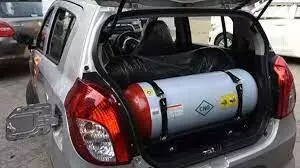- Home
- /
- Trending-News
- /
- Why Nigerians should...
Why Nigerians should explore Compressed Natural Gas

At the inception of President Bola Tinubu’s administration, the vexatious issue of fuel subsidy regime was ended to address the huge infrastructure development gap created by the use of funds to power the subsidy.
Nigeria’s infrastructure deficit, amounting to 30 per cent of the nation’s Gross Domestic Product, falls short of the international benchmark of 70 per cent set by the World Bank.
Nigeria spent more than N400 billion monthly to subsidise petroleum imports before the inauguration of President Tinubu, according to Mele Kyari, head of the Nigerian National Petroleum Company Limited, (NNPCL).
These are funds that would, otherwise be used to check infrastructure decay and shortfall in the country.
“The fuel subsidy is gone. The subsidy can no longer justify its ever-increasing costs in the wake of drying resources.
“We shall instead re-channel the funds into better investment in public infrastructure, education, health care and jobs that will materially improve the lives of millions.
“This is one decision we must bear to save our country from going under and take our resources away from the stranglehold of a few unpatriotic elements,” Tinubu said in his inaugural speech on May 29, 2023.
Nigerian were left with a choice of finding alternatives to subsidy funding that has been recognised by leading Presidential candidates of the Peoples Democratic Party and the Labour Party in the 2023 general election.
The choice offered by the Tinubu administration was the use of the Compressed Natural Gas (CNG) in vehicles, especially the commercial vehicles that constitute over 80 per cent of petrol users in the country.
At the inauguration of 30 hybrid CNG-powered buses with the capacity to transport 3,000 passengers recently, Tinubu said the use of natural gas to power the nation’s transportation industry would reduce transportation costs.
He said it would also enhance productivity, and save the nation trillions of Naira spent on the importation of Premium Motor Spirit (PMS) and Automotive Gas Oil (AGO).
”If we can enhance our energy competitiveness and bring about transformative changes like this, we will definitely be able to achieve the prosperity that we are working hard to accomplish for our people.
“These CNG buses are promising and will enhance our transportation system before the inauguration of President Tinubu.
“Countries like India have mandated CNG for all commercial vehicles since 2004. In Nigeria, commercial vehicles make up about 80 percent of our petroleum demand, costing us trillions of naira every month.
”The solution is here. We have it. We will work on it. We promise you, definitely, things will get better. Prosperity will be achieved”, Tinubu said.
Energy experts say Nigerians need to take advantage of the CNG-powered vehicles to ameliorate the huge financial implications occasioned by high cost of petrol and it attendant increase in prices of goods and services.
“CNG is an important and feasible gaseous fuel that is relatively very cheap, environmentally friendly, safe to handle, and has abundant available energy resources.
“By considering the availability and infrastructure facility, CNG seems to be a prominent alternative fuel for diesel engine applications’’, says Ashok Nanthagopal in a study on Eco Friendly Biofuels for CI Engine Applications published in Natural Gas (Second Edition).
According to him, earlier reports showed that CNG fuel could stand well below conventional fuel for the consideration of performance aspects.
Olalere Odusote, former commissioner for energy to the Lagos state government said the CNG powere-vehicles are worth embracing.
“By embracing CNG, we can enhance energy security, create jobs, and propel Nigeria towards a brighter future for all its citizens”, the media recently quoted him as saying.
Experts say that CNG use is gaining acceptance worldwide because of its environmental and economic benefits; it is a clean-burning fuel that produces lower emissions than traditional gasoline or diesel, and it can also be less expensive to use.
Some of the known advantages of CNG use include lower emission, energy savings, energy security, and longer engine life.
The disadvantages include limited range, limited fueling infrastructure, high upfront costs and safety concerns.
The concern of Nigerians centres on the disadvantages of the CNG use and the availability of conversation service.
The government, has responded to this concern through the Presidential CNG Initiative, established as a component of the palliative intervention of the administration to cushion the hardships of the fuel subsidy removal can allay the fears of users.
Another energy expert, Mr Taiwo Adewole said that the introduction of CNG)vehicles into Nigveria’’s transport industry would help fight pollution.
“CNG powered vehicles and generators will help fight pollution from fossil fuel that an average Nigeria uses on a daily basis. The government also needs to work on adequate power supply’’, he told a local energy medium.
Retired Air Vice Marshal Akugbe Iyamu, former Acting Director-General, National Emergency Mangement Agency.
“There is simply no way to turn back on delivering CNG for all Nigerians. It is the right thing to do’’ Iyamu said.
Mele Kyari the Group Chief Executive Office of Nigerian National Petroleum Company Limited has also thrown his weight behind the CNG initiative.
“Is it late? Yes,, but we will make progress, we will cover the gap in order to ensure that the volatility we see with Premium Motor Spirit does not apply to gas’’, said Kyari.
This is possible through making accessible and assessable the process of conversion and continuing encouragement of its use among both the commercial and private car owners in the country.
Those in the transport industry, however, say the decision to use CNG for vehicles depends on individual needs and preferences, as well as the availability of refueling infrastructure in the country.




